- Homepage
- Nutritious choice foods
- What Is Health Span
What is health span?
What is health span and is there anything that we can do to ensure that our last years are not spent in misery? Are our seventies inevitably to be dreaded? And what about the eighties and nineties?
It is indeed a shame that so many people today assume that their last years will be utterly miserable. They have absolutely no desire to live to a ripe old age, see their grandchildren marry and have families.
And with justifiable reason they fear old age; they know that many of their friends have dementia or live in terrible pain with cancer, chronic degenerative diseases and disability.
Is there anything we can do to extend our "health span?" Not just alive but well, full of vigour and having a ball? Yes, there certainly is.
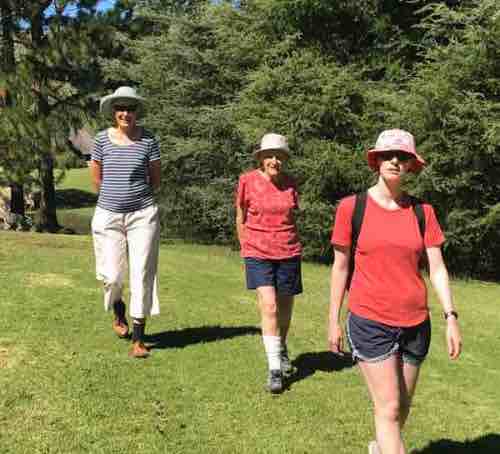 The woman in the centre turned 99 this year
The woman in the centre turned 99 this yearWhat is health span?
Life span has merely to do with how many years you are alive; whether you have lost your marbles, are in terrible pain and are completely disabled is neither here nor there.
Health span has more to do with disease-free and active years. What we are looking at is quality rather than length of life. No one has any desire to live to 90, unable to leave your bed unaided and not even recognising your own children.
What can we do to ensure that's not our fate? Modern health care is beginning to look at proactive prevention of disease that goes far beyond vaccines and cholesterol tests.
The continuous glucose monitor is one example. Researchers tell us that nearly 50% of those eating typical grocery store meals are prediabetic; worn for just two weeks, the immediate feedback would tell us which foods are causing insulin resistance and totally undermining our wellbeing.
The "Blue Zone" people
You may have heard of the five places in the world where reaching an active, busy ninety is the experience of one in three; and ten times as many people live to 100. Google "Blue Zones," watch the electrifying series on Netflix and listen to Dan Buettner on TED talks. It might just turn your life upside down.
There are no old age homes, gyms don't exist and, surprise, they drink quite a lot of alcohol in four of the five. The exception is in Loma Linda where the Seventh Day Adventists are teetotalers.
Perhaps a bother for you but in all five regions they are really quite religious; but confusingly they belong to various different faiths. None of them are Protestant Christians.
As an Anglican it is deeply disturbing to me that my fellow Christians have such little commitment to caring for "the temple of Holy Spirit." We are convinced that God doesn't live in cathedrals, mosques and shrines but in our bodies, individually and collectively as the Church; but there is a massive gulf between our knowing and our doing.
Broad beans for happiness
Blue Zone people aren't vegetarians but they do eat meat sparingly. All enjoy chiefly sourdough bread and interestingly grow and love a mostly hated vegetable; the broad bean, the only source of the happy hormone, dopamine.
Broad beans have to be consumed on the day they are harvested; so you have to grow them yourself. They make you feel happy.
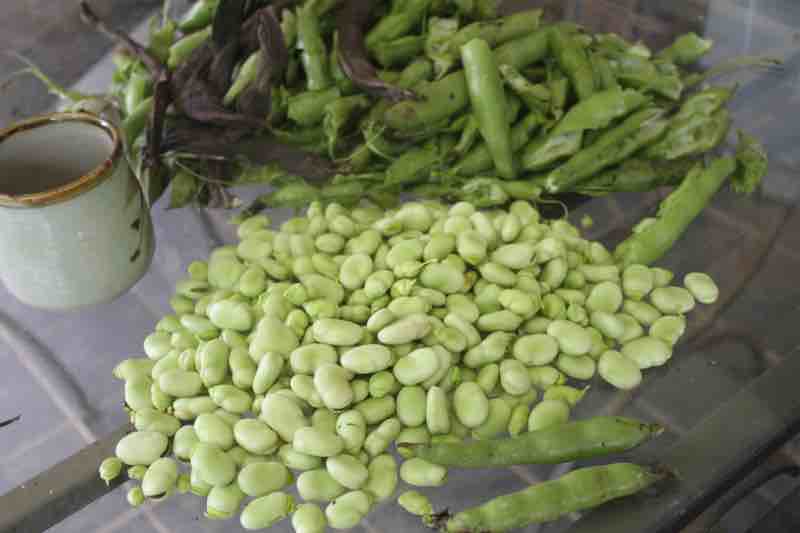 Broad beans are also called favas
Broad beans are also called favasYoung broad beans enjoyed on the day they are harvested are simply delicious. The L-dopa they contain gives some protection against Parkinson's Disease; but those exposed to industrial chemicals remain at high risk.
Compression of morbidity
Nir Barzilai, M.D., Professor of Medicine at Albert Einstein College speaks of what he calls the "compression of morbidity;" making tiny that portion of our lives when we are seriously ill.
Sharon Inouye, MD, editor in chief of the Journal of the American Medical Association points to prevention rather than cure; and the sooner we start the better. For example, the young woman who as a girl was never active, will not have achieved full bone density and is already programmed for a hip fracture.
Based on her experience in research, Dr Inouye recommends the following relatively small things that will certainly compress morbidity and add to health span.
- More fruit and vegetables
- Low refined carbs (my addition of the italics)
- Avoid tobacco and excess alcohol
- Keep mentally active (crosswords, chess and sudoku)
- Socially engaged with activities like volunteering
- Regular aerobic and strengthening exercise
Fruit and vegetables
There's a synergy of activities than we can tap into. Dr Inouye is recommending obviously that we consume extra fruit and vegetables. If you were to start growing some of them yourself, you would get more exercise, vitamin D from sunshine and the assurance of food with no ecocides.
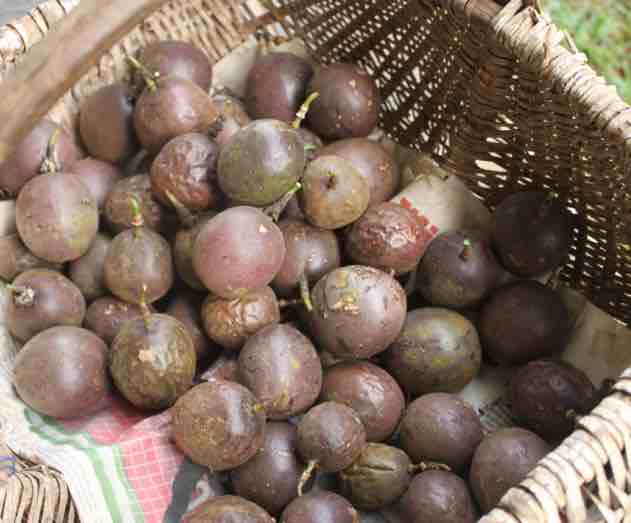 Basketful of passionfruit
Basketful of passionfruitUnrefined carbs
Unrefined carbs are in the main extremely difficult to purchase; so the recommendation generally is to accept a diet low in all starches. That verges on the impossible for most of us; and rightly so as there are alternatives.
There is a worrying trend in Okinawa for example where the people are turning from their staple carb, the sweet potato to polished white rice.
So we personally for example bought a mill for 100% real flour and started baking our own sourdough bread daily. It's been a treble win; a very tasty, nutritious loaf at a fraction of the price. The lignans in true whole grains give almost 50 percent protection against breast and prostate cancer; that is massive.
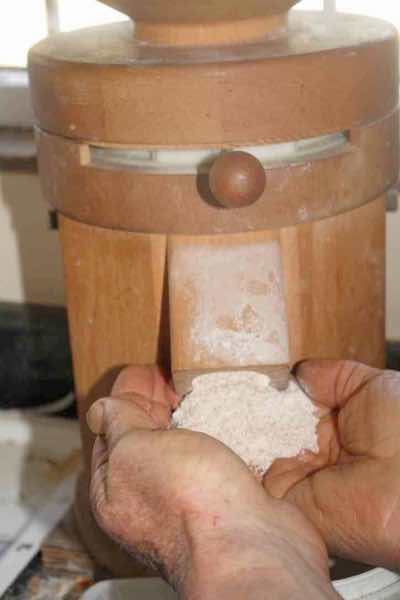
True wholewheat flour is rich in fiber, protein and excellent fatty acids. It has a low GI; and the bread made tastes wonderful.
"Starches with a higher "Carbohydrate Quality Index" are associated with a 73% lower risk of dying from rectal cancer. Specifically mentioned are those foods high in dietary fiber with a low GI; and restricted alcohol and sugar-sweetened beverages."
- BMC Medicine[10]
Colorectal cancer is growing alarmingly; especially amongst younger people. Those eating typical supermarket food are consuming less than 50% of the recommended daily allowance of fibre.
Minimising alcohol
In fact the research is saying that we should avoid all commercial alcohol; even one glass of wine per week significantly increases the risk of breast cancer, for example.
The Blue Zone people actually drink quite a lot; but it is not the commercial booze you'll find at the store. They enjoy local wines, beers and meads that are neither pasteurised nor sterilised with sulphites; and in Okinawa even a very strong spirit. Some brew their own concoctions.
On the island of Ikaria for example, one of the five Blue Zone regions, there is a large beekeeping fraternity; the plant food for the honey is mainly organic. They brew their own special meads.
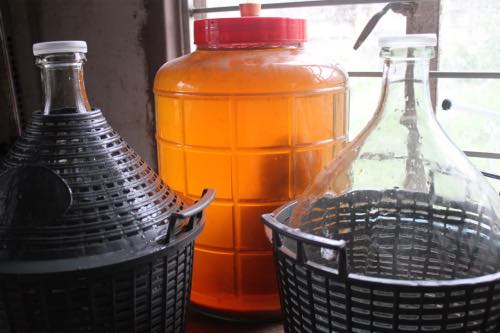 A peppadew mead brewed with honey
A peppadew mead brewed with honeyMentally active
I think we all know that the brain needs to be kept active just like our muscles and joints.
Surprisingly the brain uses nearly half the oxygen we breathe in; that's why a stroke is so serious. Keeping our minds busily challenged with mental games, joining bridge clubs or a host of the other teasers daily is so vitally important to keep the neurodegenerative diseases at bay.
One in nine Americans at 65 already has Alzheimer's Disease.
One in four elderly Chinese has Parkinson's. Make sure you are the exception that proves the rule.
Compress the morbid years; keep mentally active. I do it by building this website; it keeps me abreast of all the latest research and enables me to pass it on to you.
I am Bernard Preston, DC. I have been building this site for 20 years; it has more than 900 entries. It gives me what the Japanese call ikigai; a purpose for living.
Socially engaged
Being in regular contact with other people is very important part of extending your health span; church activities, card clubs and woodworker's guilds. The sky is the limit. Perhaps you are a gardener or belong to a flower-arranging society; or a group of chefs who love to cook together.
Every year at Our Green Home we have groups of people that meet to learn how to grow broad beans, for example; make probiotics or bake true wholegrain bread.
Aerobic and strengthening exercise
The easiest and perhaps most important of them all is simply taking several walks every day. I mentioned the synergy of these benefits. Aerobic exercise after a starchy meal is the successful way of keeping your blood glucose down; just 10 minutes would be effective, though half an hour obviously far better.
Gardening is excellent strengthening exercise.
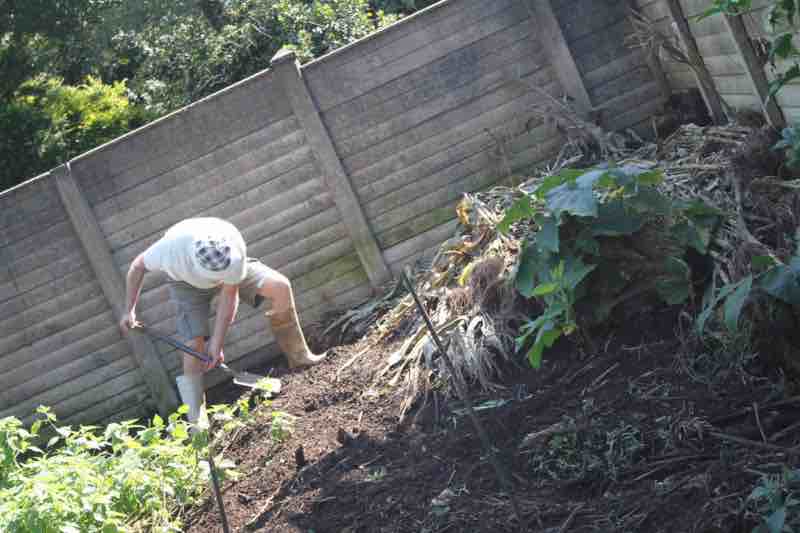 Building a compost heap
Building a compost heapSo what is health span? Do you feel challenged to be like that lady about to turn 100 in 6 months time. She's my aunt, living in her own apartment at the top of a flight of stairs; she does all her shopping, cleans her home and cooks for herself.
- Health span years: 99
- Morbidity years: 0
She is mentally active, belongs to a reading club that meets weekly and volunteers in a second-hand book shop every Wednesday morning. She was a school librarian. She walks regularly unaided down to the river in her village and back home; it's quite a pull. An endless train of people visit including numerous great grandchildren.
She does have two health issues but is on top of both of them; neither hold her back.
Her life is a challenge and an inspiration to each and every person she meets.
The material expressed on this page is gleaned from the nutritional and environmental literature; it is clearly referenced. A plain distinction is made between the author's opinion and that which is scientifically proven. When in doubt consult your health professional.
To suggest a correction or clarification, write to Dr Bernard Preston here. Contact.
When browsing use right click and "Open Link in New Tab" or you may get a bad gateway signal.
Newsletter
Our newsletter is entitled "create a cyan zone" at your home, preserving both yourself and Mother Earth for future generations; and the family too, of course. We promise not to spam you with daily emails promoting various products. You may get an occasional nudge to buy one of my books.
Here are the back issues.
- Lifestyle and ideal body weight
- What are ultra-processed foods?
- Investing in long-term health
- Diseases from plastic exposure
- Intensive lifestyle management for obesity has limited value
- A world largely devoid of Parkinson's Disease
- The impact of friendly bacteria in the tum on the prevention of cancer
- There's a hole in the bucket
- Everyone is talking about weight loss drugs
- Pull the sweet tooth
- If you suffer from heartburn plant a susu
- Refined maize meal and stunting
- Should agriculture and industry get priority for water and electricity?
- Nature is calling
- Mill your own flour
- Bake your own sourdough bread
- Microplastics from our water
- Alternative types of water storage
- Wear your clothes out
- Comfort foods
- Create a bee-friendly environment
- Go to bed slightly hungry
- Keep bees
- Blue zone folk are religious
- Reduce plastic waste
- Family is important
- What can go in compost?
- Grow broad beans for longevity
- Harvest and store sunshine
- Blue zone exercise
- Harvest and store your rainwater
- Create a cyan zone at your home
Did you find this page interesting? How about forwarding it to a friendly book or food junkie? Better still, a social media tick would help.
- Homepage
- Nutritious choice foods
- What Is Health Span
Address:
56 Groenekloof Rd,
Hilton, KZN
South Africa
Website:
https://www.bernard-preston.com